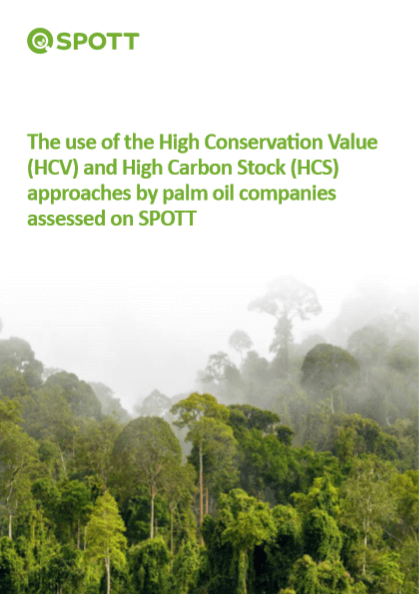SPOTT assessments score 50 of the largest palm oil producers and traders on the public disclosure of policies, operations and commitments related to environmental, social and governance (ESG) issues. The High Conservation Value (HCV) and High Carbon Stock (HCS) approaches to land-use planning are used to identify and protect important environmental and social values that need to be conserved. These approaches are of great importance to companies’ approaches to conservation in general. They also contribute to risk reduction, the implementation of commitments to no deforestation, reducing greenhouse gas emissions, and safeguarding the rights of local communities.
A new report from ZSL finds that over 70% of palm oil producers and traders assessed on SPOTT in November 2017 had made clear commitments to the HCV approach, increasing from 54% in October 2015. But despite this progress, only a third of companies clearly extend their HCV commitments to scheme smallholders and independent suppliers, indicating potential ESG risks.
Commitments to the HCS Approach are lagging behind those to the HCV approach, with only 22 out of 50 (44%) companies assessed on SPOTT making clear commitments to the HCS Approach in November 2017.
The majority (85%) of companies assessed on SPOTT disclose the extent of their areas set aside for conservation or HCV areas; however, companies do not currently make digitised maps of HCV areas publicly available. For companies on SPOTT – both members and non-members of the Roundtable on Sustainable Palm Oil (RSPO) – that have reported new plantings undertaken since January 2015, 56% have not made any HCV assessment documentation publicly available, while only 22% of companies have made the associated HCV management and monitoring documentation publicly available.
Over half (54%) of companies assessed on SPOTT report details of the HCV and other conservation area management, monitoring and/or restoration activities that they undertake. No companies assessed on SPOTT report on the ongoing participation of communities in HCV management and monitoring processes. Only a third of companies assessed on SPOTT have made clear commitments to only use licensed HCV assessors accredited by the HCV Resource Network (HCVRN) Assessor Licensing Scheme (ALS).
The findings demonstrate that companies assessed on SPOTT are progressing towards making clearer commitments and improving disclosure; however, companies need to fully realise the business case for conserving HCV areas and HCS forests, and the risks associated with a lack of effective management of these areas. Companies can demonstrate responsibility and leadership through improved and proactive disclosure. Careful inclusion of the HCS Approach in the RSPO’s Principles and Criteria (P&C) could support improved alignment between HCV and HCS, drive its adoption by many more companies, and support more sustainable land planning processes.

